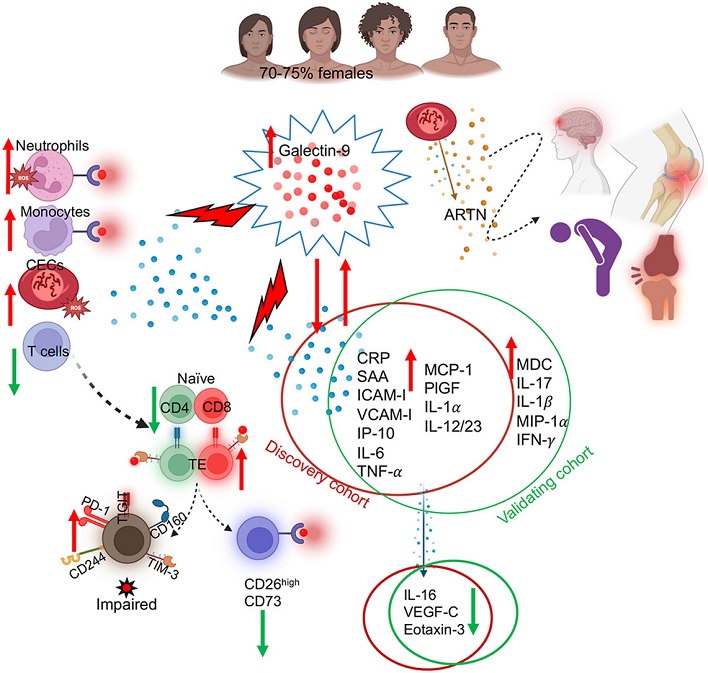Unraveling The Immune And Hematological Anomalies In Long COVID Patients With Chronic Fatigue Syndrome
Nikhil Prasad Fact checked by:Thailand Medical News Team May 27, 2024 1 year, 8 months, 1 week, 5 days, 21 hours, 53 minutes ago
COVID-19 News: As the COVID-19 pandemic continues to evolve, it has become evident that the repercussions of the virus extend far beyond the acute phase of infection. Many patients who have recovered from the initial illness continue to experience a range of debilitating symptoms, collectively referred to as long COVID (LC). Among these patients, a significant subset develops severe chronic fatigue syndrome (ME/CFS), characterized by persistent fatigue, muscle pain, and cognitive impairments. This study covered in this
COVID-19 News report was conducted by researchers at the University of Alberta, and provides a comprehensive analysis of the immunological abnormalities and chronic inflammation observed in long COVID patients suffering from ME/CFS.
 Graphical Abstract - Immune And Hematological Anomalies In Long COVID Patients With Chronic Fatigue Syndrome
Immunological Profiles in Long COVID Patients
Graphical Abstract - Immune And Hematological Anomalies In Long COVID Patients With Chronic Fatigue Syndrome
Immunological Profiles in Long COVID Patients
The researchers examined two independent cohorts of long COVID patients who developed ME/CFS-like symptoms at least 12 months post-infection. These patients were compared to individuals who had recovered from COVID-19 without any lingering symptoms. The study involved extensive clinical visits and laboratory analyses to identify the biological signatures associated with long COVID and ME/CFS.
Immune Cell Dysregulation
One of the key findings of this study was the altered immune cell profiles in long COVID patients. These patients exhibited increased levels of neutrophils and monocytes, coupled with a decrease in lymphocytes. Further analysis revealed a significant reduction in naïve T cells and an increase in terminal effector T cells, indicating persistent T cell activation and exhaustion.
The presence of immunosuppressive CD71+ erythroid cells (CECs) was also notable. These cells are typically rare in healthy individuals but were found to be abundant in long COVID patients. CECs are known to modulate immune responses and their expansion in long COVID patients suggests a dysregulated hematopoiesis.
Chronic Inflammation and Autoantibodies - Elevated Pro-inflammatory Cytokines
Long COVID patients exhibited elevated levels of various pro-inflammatory cytokines and chemokines, including IL-6, TNF-α, and MCP-1. These elevated cytokines contribute to chronic inflammation and are likely linked to the ongoing symptoms experienced by these patients.
Role of Galectin-9 and Artemin
The study highlighted the significant role of Galectin-9 (Gal-9) and artemin (ARTN) in long COVID patients with ME/CFS. Elevated levels of Gal-9 were associated with immune dysregulation, while artemin, produced by CD71+ erythroid cells, correlated with pain and cognitive impairment. These findings suggest that both Gal-9 and artemin play crucial roles in the pathophysiology of long COVID.
Impaired Erythropoiesis
The researchers found evidence of impaired eryt
hropoiesis in long COVID patients. This was indicated by an increased number of immature erythroid cells in the blood, a condition known as stress hematopoiesis. Additionally, the study observed morphological abnormalities in red blood cells, such as increased red cell distribution width (RDW), which is associated with higher mortality risk in COVID-19 patients.
Cognitive and Pain Symptoms
The elevated levels of artemin in long COVID patients were significantly associated with cognitive impairment and pain severity. Artemin is known to play a role in inflammatory pain and neuronal function, suggesting that its increased levels may contribute to the neurological symptoms observed in these patients.
The Role of Autoantibodies
Interestingly, over 50% of long COVID patients in the study exhibited autoantibodies, with antinuclear antibodies (ANA) and anti-ribonucleoprotein (anti-RNP) being the most common. The presence of these autoantibodies indicates a potential autoimmune component to the chronic inflammation and symptoms experienced by long COVID patients.
Multivariable Analysis and Predictive Markers
Using a multivariable regression model, the researchers identified several key parameters that distinguish long COVID patients from those who have recovered. These include elevated levels of terminal effector T cells, artemin, CD71+ erythroid cells, Gal-9, and MCP-1, along with reduced levels of TGF-β and mucosal-associated invariant T (MAIT) cells. These findings provide valuable insights into the mechanisms underlying long COVID and offer potential targets for therapeutic interventions.
Hierarchical Clustering
Further analysis using hierarchical clustering reinforced the importance of these parameters, grouping them with markers of immune activation and chronic inflammation. The study's findings suggest that a combination of innate immune activation, dysregulated hematopoiesis, T cell exhaustion, and chronic inflammation contribute to the pathogenesis of long COVID with ME/CFS.
Conclusion and Future Directions
This comprehensive study provides a detailed understanding of the immunological and hematological abnormalities in long COVID patients with ME/CFS. The findings highlight the roles of Gal-9 and artemin in chronic inflammation and immune dysregulation, offering potential targets for therapeutic intervention.
However, the study's limitations include a single-point sample collection and a focus on specific COVID-19 variants. Future research should involve large-scale, multi-centered studies across various long COVID subgroups, including those infected with different variants of concern. Understanding the diverse immune responses and developing targeted treatments will be crucial in addressing the long-term impacts of COVID-19.
The study findings were published in the peer reviewed Journal of Autoimmunity.
https://www.sciencedirect.com/science/article/pii/S089684112400101X
For the latest
COVID-19 News, keep on logging to Thailand Medical News.
Read Also:
https://www.thailandmedical.news/news/cerebral-microstructural-changes-linked-to-cognitive-olfactory-and-fatigue-symptoms-in-post-covid-condition
https://www.thailandmedical.news/news/covid-19-news-immune-dysfunction-altered-immune-metabolism-dysbiosis-neuroinflammation-and-viral-persistence-are-issues-causing-long-covid
